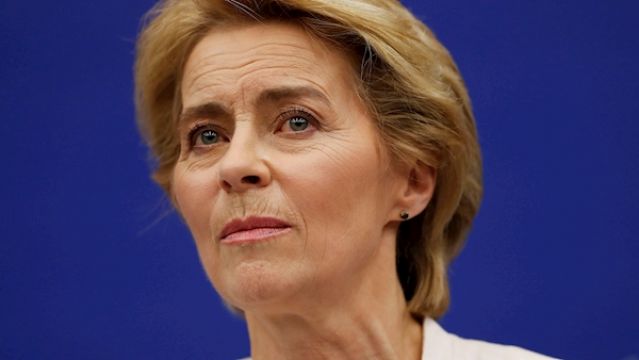In her annual State of the Union address, European Commission President Ursula von der Leyen doubled down on the flagship goals she set out on taking office last December: urgent action to tackle climate change and a digital revolution.
She unveiled a plan to cut the European Union's greenhouse gas emissions by at least 55 per cent from 1990 levels by 2030, up from an existing target of 40 per cent, and pledged to use green bonds to finance its climate goals.
"There is no more urgent need for acceleration than when it comes to the future of our fragile planet," the former German cabinet minister told the European Parliament.
"While much of the world's activity froze during lockdowns and shutdowns, the planet continued to get dangerously hotter."
Ms Von der Leyen also called for greater investment in technology for Europe to compete more keenly with China and the United States, and said the EU would invest 20 per cent of a €750 billion economic recovery fund in digital projects.
Officials said that, far from backing off the plans she laid out at the beginning of her term because of the coronavirus crisis, Ms von der Leyen believes they will be key to Europe's long-term economic and political survival.
The EU has been buffeted for years by crises, from the financial meltdown of 2008 to feuds over migration and the protracted saga of Britain's exit from the bloc.
Solidarity among the 27 member states frayed badly at the onset of the Covid-19 pandemic, when countries refused to share protective medical kit with those worst-affected and closed borders without consultation to prevent the spread of the virus.
The bloc's leaders also jousted for months over a joint plan to rescue their coronavirus-throttled economies.
But in July they agreed on a stimulus plan that paved the way for the European Commission to raise billions of euros on capital markets on behalf of them all, an unprecedented act of solidarity in almost seven decades of European integration.
Ms Von der Leyen told the EU assembly that "this is the moment for Europe" to trust each other and stand together.
"The moment for Europe to lead the way from this fragility towards a new vitality," she said. "I say this because in the last months we have rediscovered the value of what we hold in common. We turned fear and division between Member States into confidence in our Union."
Brexit deal chances fading
Turning to the troubled talks with London on the future relationship between the world's fifth-largest economy and biggest trading bloc, Ms von der Leyen said every passing day reduces chances for sealing a new trade deal.
She stressed that both the EU and Britain negotiated and ratified their Brexit divorce deal and warned the UK, which has proposed a bill that would breach elements of the pact, that it "cannot be unilaterally changed, disregarded or dis-applied".
"This is a matter of law, trust and good faith. Trust is the foundation of any strong partnership," she said.
Ms von der Leyen added that negotiations are always difficult but Brexit talks have not progressed as the EU would have wished, saying there is now very little time to seal a trade deal with the UK.
EU values
She said EU states must be quicker in their foreign policy to support pro-democracy protests in Belarus or to stand up to Russia and Turkey.
"Why are even simple statements on EU values delayed, watered down or held hostage for other motives?" she asked.
"When member states say Europe is too slow, I say to them be courageous and finally move to qualified majority voting," she said, referring to blockages over finding unanimity among the EU's 27 states.
Ms von der Leyen also lashed out against homophobic policies of the nationalist government in Warsaw, saying there was "no place" in the bloc for districts proclaimed "LGBT-free zones" in Poland.
"LGBTQI-free zones are humanity free zones. And they have no place in our Union," she said. -Reuters







